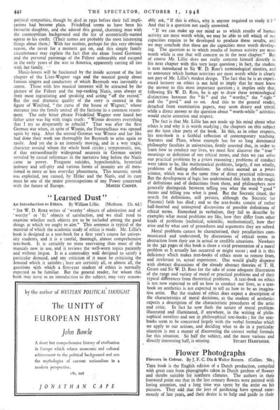" Learned Dust
S
An Introduction to Ethics. By William Lillie. (Methuen. 12s. 6d.)
" SIR W. D. Ross writes of ' worthy ' objects of admiration and of ' worthy ' or `fit' objects of satisfaction, and we shall need to examine whether such objects are to be included among the good things at which we ought to aim." This sentence is typical of the material of which the academic study of ethics is made. Mr. Lillie's book is designed as a text-book for a first year's course for univer- sity students, and it is a -careful, thorough, almost comprehensive text-book. It is certainly no more enervating than most of the manuals now in use, and it reviews the well-worn topics patiently and without jargon. It is a commodity well designed to- satisfy a particular -demand, and any criticism of it must be criticising the demand which it satisfies ; here are certainly all, or almost all, the questions with which a first-year student of ethics is normally expected to be familiar. But the general reader, for whom this
book may serve as an introduction to the subject, may very reason- . ably ask, " If this is ethics, why is anyone required to study it ? " And that is a question not easily answered.
" If we can make up our mind as to which results of human activity are most worth while, we may be able to tell which of our capacities require to be developed to produce these results, and we may conclude that these are the capacities most worth develop- ing. The question as to which results of human activity are most worth while is one that will concern us in the next chapter." But of course Mr. Lillie does not really concern himself directly in his next chapter with this very large question ; in fact, the student is next introduced to Sir W. D. Ross's terminological niceties, and to announce which human activities are most worth while is clearly not part of Mr. Lillie's modest design. The fact that he is an experi- enced lecturer on ethics is not held to imply that he must know the answer to this most important question ; it implies only that, following Sir W. D. Ross, he is apt to draw these terminological distinctions between the " fit " and the " worthy," the " right " and the " good " and so on. And this to the general reader, detached from examination papers, may seem dreary and trivial, while a direct answer to the question about " worth-while." ktivities would excite attention -and respect.
The fact is that Mr. Lillie has not made up his mind about what ethics is and why it is worth studying ; the chapters on this subject are she least clear parts of the book. In this, as in other respects, his text-book is a faithful reflection of contemporary teaching. Socrates and Plato, whose example has for so • long &Mit-laced philosophy faculties in universities, firmly asserted that, in order to learn how to conduct our lives, we must first discover the " true " meanings or definition of our ethical terms, and then we can solve our practical problems by a priori reasoning ; problems of conduct were taken to be, like mathematical problems, largely, if not wholly, problems of finding definitions. So , ethics seemed an a priori science, which was at the same time of direct practical relevance. But the development of logic has undermined this faith in the magic of definitions and of deductions from them, and philosophers now generally distinguish between telling you what the word " good " means and felling you what is good. But the Socratic ritual, the search for definitions, still persists, although the Socratic (or Platonic) faith has died; and so the text-books consist of rather half-hearted and uninspired discussions of possible definitions of ethical terms. Enmeshed in verbalism, they fail to describe by examples what moral problems are like, how they differ from other kinds of problems (technical, scientific, mathematical), how they arise and by what sort of procedures and arguments they are solved.
Moral problems cannot be characterised, their peculiarities com- municated and understood, by discussions of ethical terms in abstraction from their use in actual or credible situations. Nowhere in the 342 pages of this book is there a vivid presentation of a moral problem as It actually has occurred or might occur ; and it is this deficiency which makes text-books of ethics seem so remote from, and irrelevant to, actual experience. One would gladly dispense with abstract discussions of the already abstract theories of T. H. Green and Sir W. D. Ross for the sake of some adequate illustration of the range and variety of moral or practical problems and of their typical differences from theoretical problems. A text-book on ethics is not now expected to tell us how to conduct our lives, as a text- book on aesthetics is not expected to tell us how to be an imagina- tive artist. But the student of ethics does expect a description-of the characteristics of moral decisions, as the student of aesthetics expects a description of the characteristic procedures of the artist and critic. In fact he now finds the nature of moral problems illustrated and illuminated, if anywhere, in the writing of philo- sophical novelists and not in philosophical text-books ; for the text- books seem to be concerned largely with the verbal formulae which we apply to our actions, and deciding what to do in a particular situation is not a matter of discovering the correct verbal formula for this situation. SO half the subject, and the more various and directly interesting half, is missing. STUART HAMPSHIRE.


































 Previous page
Previous page